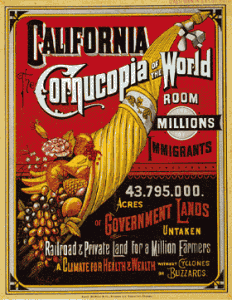15 December 2010
Global climate change threatens the much-envied California lifestyle
Posted by mohi

A part of the problem: California's car culture contributes to climate threats to other important aspects of the California lifestyle. Photo courtesy of Robert S. Donovan
The allure of an active, outdoorsy existence filled with every variety of incredible fresh food and peerless wine drew me to California. All of this could be lost, I learned yesterday at the linked afternoon sessions H23M and H24F. Global climate change may eliminate much of the good life in the Golden State.
Appropriately, storms in the San Francisco Bay yesterday added to the snowpack in the Sierra Nevada mountain range, otherwise known as the the state’s water cooler. “Sunny” California gets all of its rain in the winter months. Fortunate for us, the water chills out at altitude until melting brings it to us just when we need it in the summer for drinking, irrigation, power generation, and recreation. Climate change could shift those lucky seasonal patterns, bringing a cascade of bad news for the California Republic, according to the science presented.
The climate change predictions for California coming from the growing scientific consensus were introduced by UC Davis environmental engineer Jay Lund. Higher concentrations of carbon dioxide will produce, among other changes, warmer temperatures and declining winter snow fall in the Sierras, he said. Ocean acidification and potentially 55 inches of sea level rise by 2100, means “bye bye, Beach Blanket Bingo” for the 80 percent of Californians living on the coast, closely tied to the fate of the Pacific Ocean.
Joshua Viers, a watershed scientist from UC Davis, described the Sierras as one of the linchpins of the entire water system of the state. “We ask a lot from this mountain range,” he said, calling the Sierra’s a “treasure trove of ecosystem services,” including ski resorts, fly fishing, and whitewater boating on top of the drinking water and food California produces from that all-important snowpack. Viers’ data suggest that rain will replace some of the snow in the Sierras, changing the flow of rivers across the entire western slope of the mountains. Rainbow trout habitat would be severely restricted and fragmented, and whitewater river runs may dry up.

“California, The Cornucopia of the World,” from the cover of an 1885 book by the California Immigration Commission.
Farmers and foodies alike should dread what looms ahead for the San Joaquin valley, the nation’s salad bowl and general agricultural paradise. Francisco Flores-Lopez of the Stockholm Environment Institute (SEI) fed climate change predictions into computer models of plant growth. He found that the growing season for corn in California could be shortened from 120 to 104 days! While I thought more carbon dioxide would help plants flourish, Flores-Lopez showed that expected increases in this greenhouse gas will lower yields of corn, almonds, and tomatoes by 3 to 7 percent.
I’m certain winemakers (and drinkers) would like to know what impacts can be expected for the grape harvest. Kimberley Nicholas, from the Center for Sustainability Studies at Sweden’s Lund University, interviewed California pinot noir farmers about their understanding of the changes to come. Fresno has 3 degrees higher temperature than Napa, impacting fruit quality. Napa farmers get 16 times more per ton for their higher quality fruit. Yet, three degrees of warming is near the middle range of most global warming predictions. Some grape growers have already begun spending precious water resources to provide mist-based air-conditioning for their baking fruit.
Finally, water warming could eliminate the Chinook salmon from California rivers before the end of the century, according to Marisa Escobar’s data and models. The SEI scientist found that if water management policies at hydroelectric dams on the salmon runs were modified, the river would stay chilly enough to preserve the fish. But this comes at the expense of up to 20 percent of California’s green power generation, a heartbreaking tradeoff.
—Keith Rozendal is a science communication graduate student at UC Santa Cruz


 GeoSpace is a blog on Earth and space science, managed by AGU’s Public Information staff. The blog features posts by AGU writers and guest contributors on all sorts of relevant science topics, but with a focus on new research and geo and space sciences-related stories that are currently in the news.
GeoSpace is a blog on Earth and space science, managed by AGU’s Public Information staff. The blog features posts by AGU writers and guest contributors on all sorts of relevant science topics, but with a focus on new research and geo and space sciences-related stories that are currently in the news.
Thanks for referencing our work in your blog. I would like to make a couple of clarifying comments: 1) the results shown are not for all Chinook salmon, but they are specific to spring-run Chinook salmon; and 2) the statistic of 15-20% reduction in hydropower is not for all California, but it is specific to the Centerville powerhouse in Butte Creek which is part of a 6.4 MW project. Spring-run Chinook salmon are threatened and 70% of the population spawns and holds during the summer in Butte Creek. Also, the range of hydropower reduction estimated from our models was obtained under a targeted management adaptation to put more water in the Butte Creek River in the hottest weeks. While the characterization of the effects of climate change reported in my talk do relate only to spring-run Chinook salmon viability and hydropower production in Butte Creek, the tradeoffs that you described in your blog are likely to exist in other watersheds in California.